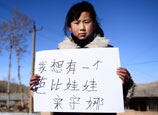
He also pledged to put forward an insurance program for serious diseases and a medical emergency aid system in rural areas to help people with medical bills they cannot pay.
The focus of medical reform during the 12th Five-Year Plan period (2011-15) is changing to enhance service quality, Vice-Premier Li Keqiang said.
"Increased financial support and innovative ways are needed to ensure that patients, doctors and hospitals all benefit from the country's medical reform," he said at a meeting on Saturday.
Li is head of the leading group for medical and healthcare reforms of the State Council.
The nation began reforms to its medical and healthcare systems in the 1980s, and the latest round was started in March 2009 to provide all citizens with equal access to basic healthcare and medical services.
"Our medical reform directly targets the urban-rural gap and the regional gap. It has won strong support from the public, because it started with strengthening services at grassroots levels and favoring central and western regions as well as rural areas," Xinhua News Agency quoted Li as saying.
Apart from ever-increasing government subsidies, he called for innovation in fields including management, operation, personnel and distribution.















 Busiest line in Beijing: Subway line 10 has reached a daily transportation of 1 million passengers on average
Busiest line in Beijing: Subway line 10 has reached a daily transportation of 1 million passengers on average


![]()
